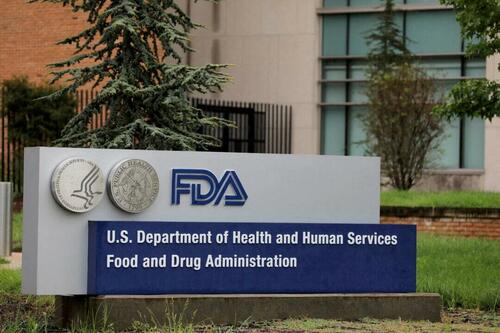Authored by Aldgra Fredly via The Epoch Times (emphasis ours),
The U.S. Food and Drug Administration (FDA) issued recommendations to vaccine makers on Thursday regarding the virus strains to be used in the 2025–26 influenza vaccines, after canceling a meeting of its vaccine advisers last month that had been scheduled for March 13.

The strain composition recommendations for flu shots usually involve input from the FDA’s Vaccines and Related Biological Products Advisory Committee (VRBPAC), but this year, the agency excluded its advisers from the decision-making process.
Instead, the FDA held a closed session with experts from its Center for Biologics Evaluation and Research, along with officials from the U.S. Centers for Disease Control and Prevention (CDC) and the Department of Defense, to review U.S. and global surveillance data on currently circulating flu viruses.
That interagency meeting was held on the same day that the VRBPAC was originally scheduled to meet. In a statement, the FDA said it does not expect any impact on the timing or availability of vaccines for the public.
The regulator recommended using the trivalent formulation of egg-based influenza vaccines for the next flu season, containing two influenza A subtype viruses and one influenza type B virus.
The FDA stated that it has informed vaccine manufacturers of its recommendations and expected “an adequate and diverse supply of approved trivalent seasonal influenza vaccines” for the upcoming influenza season, which covers the fall and winter of each year.
The reason for the cancelation of the VRBPAC meeting remains unclear. The FDA did not offer an explanation.
The Infectious Diseases Society of America (IDSA)—which represents over 13,000 physicians, scientists, and public health experts—had urged the FDA to reschedule the meeting, saying that its cancelation could endanger public health as the nation faces its worst flu season in more than a decade.
“Cancelling this meeting means vaccine makers may not have the vital information and time they need to produce and distribute targeted vaccines before the next flu season,” IDSA President Tina Tan said in a Feb. 27 statement.
Seasonal influenza activity has remained high in the United States, with at least 40 million illnesses recorded so far, according to the CDC. Of these, 520,000 patients were hospitalized, and 22,000 have died from flu as of March this year.
The cancelation of the FDA’s advisory committee meeting came after President Donald Trump’s nominee for health secretary, Robert F. Kennedy, was confirmed by the Senate on Feb. 13.
Kennedy told employees at the Health and Human Services (HHS) on Feb. 18 that nothing would be off-limits as he led investigations into children’s health, identifying vaccinations as possible factors behind the rise in chronic diseases.
In his address, Kennedy emphasized that his main mission at HHS is “to reverse the chronic disease epidemic” in the United States.
Besides hearing from its advisers, the FDA typically consults with the World Health Organization (WHO) on the composition of the influenza vaccines before making recommendations. The agency was not included in the FDA’s recent meeting on flu vaccines.
Trump has withdrawn the United States from the WHO, citing the WHO’s “mishandling of the COVID-19 pandemic that arose out of Wuhan, China,” and other global health concerns.
The president stated that the WHO had failed to “adopt urgently needed reforms” and was unable to demonstrate independence from “the inappropriate political influence” of member states.
The United States was the largest contributor to the WHO, having contributed about $1.28 billion during the 2022-2023 biennium, according to the organization’s website. It stated that U.S. experts supported nearly half of WHO joint external evaluation missions last year.
Zachary Stieber contributed to this report.
Loading...